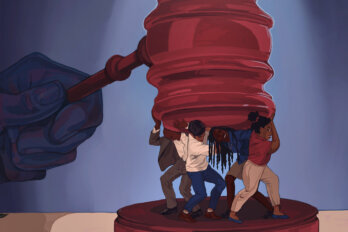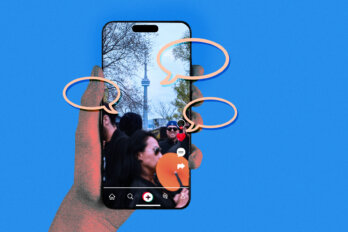Last fall, while I was posting on my Toronto building’s resident-run Facebook group, a man I didn’t know from another floor started trolling me. I was writing on behalf of the security committee I volunteer on, and instead of accepting my posts about inexpensive home alarms and Airbnb security issues as information sharing, he decided I was inciting paranoia. His comments soon turned into personal attacks. First, he questioned my qualifications. Then he said I was hateful person, and finally, he claimed I was targeting someone—a stranger—on another floor. At that point, the group’s unofficial moderator decided his posts were unacceptable and deleted the thread.
Afterwards, several neighbours checked in to make sure I was okay. I wasn’t. This man wasn’t an anonymous person from the internet. He lived in my building. I didn’t know what would happen if I ran into him in person or what was he capable of doing. But I felt like it was only a matter of time before our paths crossed offline, and sure enough, that spring they did. One Saturday morning, I walked into a neighbourhood fitness class and came face to face with my troll. I recognized him from his profile picture; I’d been dreading seeing his face for months. I was nervous about approaching him, but I also wanted him to see I was a living, breathing human being, not an internet avatar. I wanted him to understand the impact of his words.
Galvanized, I asked for an apology. “Let’s go for coffee and discuss it,” he said. “You can contact me later to make the arrangements.” I was confused. A coffee invite seemed polite, but it didn’t sit right. As a woman, I’ve too often found myself in situations—at work, in meetings, on committees, and even in romantic relationships—where I’m expected to do the administrative work, as if I’m a secretary from a 1950s typing pool. In many situations, the expectation is I’ll also do the emotional labour, as an informal (and unpaid) therapist. I wondered if he truly saw our coffee as an opportunity for discussion or if it was a stalling tactic—maybe even an outright refusal—to acknowledge his harmful behaviour. If I went to the trouble of scheduling the coffee and then spent my time explaining how he’d made me feel, would an apology be forthcoming? And how much work would it take to get one?
Sometimes, it’s best to take things offline. Take a follow-up meeting with a colleague over an email exchange or calling a friend or loved one after a text message puzzled or provoked. But these are people we know—and, more importantly, these are interactions that happen right away. The let’s-do-coffee-in-the-vague-future move delays an apology (or any chance at a conversation about what happened). It’s a power play—the perfect #SorryNotSorry for our age of egos. This era is defined by our current elevation of people (and presidents) who now regularly steamroll over the truth, and others’ reputations, like nothing matters except for them and their version of the narrative. When you have to ask for an apology, and set up an appointment to make the case for getting one, the other party keeps all control. But, as civility expert Lew Bayer reminds me when I ask about our obligation to say “I’m sorry,” an apology is a repair behaviour. It works best when it’s heartfelt and freely offered.
“As grown-ups, we have to understand we’re held accountable for the impact of our words and our actions,” Bayer says. “We need to be more socially aware.” To be fair, that social awareness is trickier online. When we write emails, texts, tweets, and posts, we’re all broadcasting messages that can easily be misinterpreted, maligned, mangled, and manipulated. In fact, in a 2016 behavioural study, researchers showed even your best friends have trouble interpreting the emotional intent of your online communications. It likely doesn’t help that, when it comes to strangers, our online interactions often feel bolder, angrier, and more vicious than any we’d typically have with any stranger on the street or in an elevator. No wonder any potential meeting can seem more like an opportunity to mount a defence, not reach a common ground.
The nonapology power play can go both ways. Sometimes, the person initiating the coffee invite “to discuss” a dispute is the person who feels wronged. A few years ago, Ingrid Paulson, a Toronto-based book designer and the publisher of Gladstone Press, noticed her colleagues posting about her neighbourhood’s new business improvement area’s logo on Twitter. She chimed in with her own critique from a design perspective but issued no personal attack on the designer. To her surprise, he tracked down her contact information, emailed her, and invited her for coffee to talk about her criticism. The back and forth still sticks in her mind. “I do actually go for coffee with strangers, but this time, there was something weird,” Paulson says. “I realized he was saying, ‘You said this about my work, and I want you to put your body behind that and meet me and stand up for what you said.’ It was a power play.” She sent an email explaining her critique but declined the coffee invitation.
Matt Cahill, a Toronto registered psychotherapist, agrees a coffee invite delaying a conversation that can easily happen in the moment is, very likely, a move to assert a certain power dynamic. “When I first came across this whole trend of ‘let’s meet for coffee to discuss it,’ it felt like, who are you? Are you an ambassador—you have to get on a plane to go to Switzerland, so we’re going to do this later?” he says. Cahill points to Sarah Schulman’s book Conflict is Not Abuse. In it, she asserts that people are increasingly conflating conflict with threats, so instead of listening, negotiation, and resolution, we get an enormous smokescreen under which people can feel justified in denying any wrongdoing. In other words, you start by calling out a misunderstanding or disagreement and wind up having to defend yourself from a terrible accusation. “It feels like Snakes and Ladders,” Cahill says.
Escalation also seems to happen faster online, particularly when people are trying to speak out on an issue—and even more so when old power dynamics, like gender, race, and, colonialism, are what’s perceived to be under threat. It’s become so heated on social media that people are targeted for existing in the world as they are. “I feel a real expectation to step up and say things, especially as they pertain to matters that affect people of colour and women,” says Bianca Spence, a culture worker and co-organizer of the Toronto Women’s March. When she engages with people online, discussions sometimes turn into debates or personal attacks—in public. Surprisingly, Spence also adds that she receives a lot of apologies for those attacks. But they almost never happen in a public forum, in the same space where the harm was done. Sometimes, she’ll get an “I’m sorry” in a direct message on social media; other times, people quietly approach her in person at event, when she’s not in the position to be candid with them about the harm they’ve caused. It’s as if they know she’s not likely to cause a scene.
“It’s not a very satisfying apology. It prioritizes their safety over mine,” she says. “My lived experience is sometimes I don’t feel like I get the apology I deserve.” When an apology is sincere, a private exchange can make a difference, but if the altercation remains public for all the world to see, that apology won’t fully repair the damage done. It’s yet another way the online-offline disconnect weakens the repair potential of the apology—and keeps the party who’s apologizing in control of the public narrative. Nobody else will ever know that someone who bullies, disparages, and humiliates on social media is remorseful. All the rest of us get to see is the initial attack-defence sequence reinforcing the power dynamic. We don’t register any attempt at dialogue. Under those conditions, the repair of the apology only goes partway. The apology might help repair how a target feels about the other person, but it won’t affect anyone else’s perception of the interaction.
It’s possible people are following a narrow, outmoded idea of what an apology should be and forget that their hurtful words, were in fact, broadcasted. But we’re not all naive. There is also a reticence to apologize online for an online offence. In real life, people say, “I’m sorry,” “my bad,” “I didn’t mean that,” or “I said the wrong thing” to each other all the time. Sometimes, even a “whoops” said with candour can be a good-enough acknowledgment of error. Is there something iron clad about an online persona that makes it impossible for people to type those same words into the platform where the offence happened, for all to see? Do people have a sense that by having an online voice, they are, as Cahill says, as powerful as an ambassador and thereby must play at politics?
The difference between a power play and a true apology often comes down to dialogue. The phrase “power play” conjures sports and one-sided advantages—a game played for amusement. That’s very different from dialogue. A dialogue between two people is something you’re in together. It can’t be won. We’re constantly told that the point of social media and online forums is to have a conversation. But what if that’s not what’s happening, and instead of a meaningful exchange, our online communications are becoming unidirectional? The more we use these platforms to tell people things, the more potential social media has to change how we perceive ourselves in the world. If our online personas increase our feelings of self-importance, it seems that they’re also making us increasingly inflexible and less likely to concede, compromise, or admit to mistakes. It is not such a stretch to imagine people online are modelling themselves after world leaders and famous people who deny wrongdoing, won’t admit mistakes, or stubbornly refuse to change course, even as it becomes clear their course leads only to folly, at best, and destruction, at worst.
I decided against coffee with my neighbour—largely because I didn’t think an apology would be forthcoming. He had not apologized when his post was removed, and he had not apologized when I later confronted him. But it’s not the end of the world to apologize for something you did or said offline or online. You recognize a mistake you made and say, “I’m sorry.” You talk about it, you learn, you try not to do it again. That’s a human experience. And, despite our increasing integration of technology into our lives, we are still all human.





